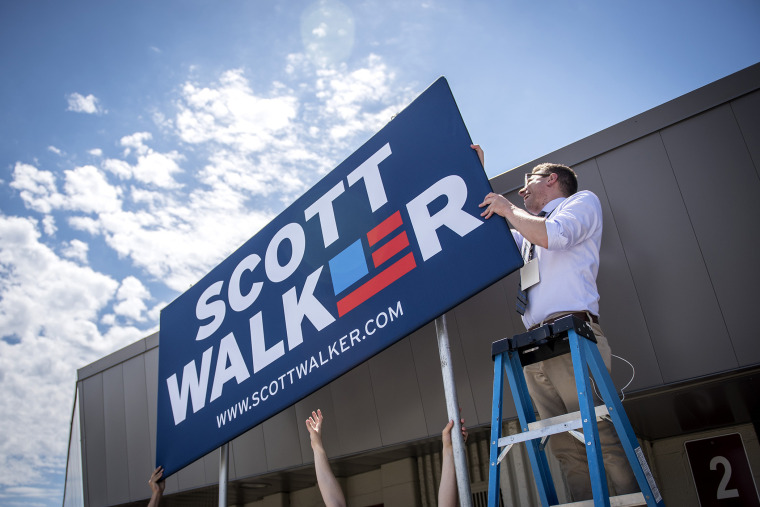Given our previous
coverage of Wisconsin Gov. Scott Walker's (R) "John Doe" controversy, it's only fair to note that as of yesterday, by order of the state Supreme Court, the investigation is no more. The Milwaukee Journal Sentinel
reported:
Dealing Gov. Scott Walker a victory just as his presidential campaign gets underway, the Wisconsin Supreme Court in a sweeping decision Thursday ruled the governor's campaign and conservative groups had not violated campaign finance laws in recall elections in 2011 and 2012. The ruling means the end of the investigation, which has been stalled for 18 months after a lower court judge determined no laws were violated even if Walker's campaign and the groups had worked together as prosecutors believe.
That last phase -- "even if Walker's campaign and the groups had worked together as prosecutors believe" -- is of particular interest. Conservative judges have concluded that even if the Republican governor and his team did exactly what they are accused of doing, it doesn't matter.
To briefly
recap the controversy, Wisconsin election laws prohibit officials from coordinating campaign activities with outside political groups. There is, however, ample reason to believe Walker and his team were directly involved in overseeing how outside groups -- including some allegedly non-partisan non-profits -- spent their campaign resources.
Several conservative judges, including a majority of the state Supreme Court, have a problem with the law itself -- so long as outside groups aren't explicitly trying to bribe a public official, the rationale argues, the coordination, no matter how explicit, is permissible.
Or put another way, as yesterday's dissent emphasized, it's an "anything goes" policy when it comes to politicians partnering with outside groups to win elections.
For Walker, the ruling is obviously a relief -- no presidential candidate wants to campaign for national office with an unresolved scandal pending, and the Wisconsin Supreme Court's ruling frees the governor from worrying about this controversy going forward.
But looking ahead, the story isn't quite finished. The next question is focused less on Walker and more on the judges who just did Walker a favor. Political scientist Norman Ornstein yesterday described the Wisconsin Supreme Court as the "
worst court in America," and it's worth appreciating why.
Yahoo News' Michael Isikoff
reported yesterday, for example, about the conflict-of-interest allegations swirling around the case. "Critics immediately noted that two of the justices on the court who ruled in Walker's favor had been elected with $10 million in contributions from outside advocacy groups, which don't disclose their donors and which were the very subjects of the Walker investigation," Isikoff explained.
Well. That seems important.
Elections-law expert Rick Hasen
added that one of the prosecutors in this case asked at least one of the Wisconsin Supreme Court justices to recuse himself/herself from the case, "because the justice may have been supported by some of the campaign spending in the case." The court's majority ignored the request, which may lead to a review from the U.S. Supreme Court.
The dissent notes that under the U.S. Supreme Court's Caperton decision, the failure to recuse in this case could be a due process violation. At least theoretically, that's an issue which could go to the U.S. Supreme Court. The Court could also potentially consider the First Amendment holding about coordinated issue advocacy.
Watch this space.
